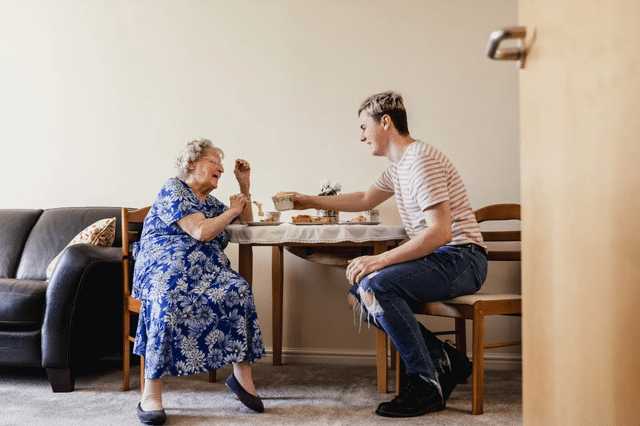
Don’t underestimate the power of grabbing coffee with a friend or visiting your grandparents.
Spending time with friends and family, joining a local book club, or striking up a conversation with a coworker affects much more than temporarily boosting mood; these acts can help you live longer.
A new study sheds light on just how dangerous loneliness is: Researchers found those who felt lonely, didn’t have anyone to confide in, lived alone, did not have visits from friends and family, or did not engage in weekly group activities faced a higher risk of dying from any cause.
“This result suggests there may be a hierarchy of components of social connection for those who experience numerous types of social disconnection,” the authors conclude in the study, published this month in the BMC Medicine journal. “Our findings suggest that advice, interventions, and policy may need to be tailored to address different aspects of social connection and target the highest risk groups.”
Using the U.K. Biobank, which since 2006 has been holding health data from half a million U.K. residents, researchers analyzed data from over 450,000 people before and after 12 and a half years. At the end of the study, about 33,000 participants—7% of the cohort—died. All of the loneliness factors increased people’s risk of dying. Most notably, those who do not have visits from family or friends had a 39% increased risk of dying compared to those who had daily visits. However, researchers conclude monthly visits reduced this mortality risk, underscoring the importance of small adjustments to reduce the health risks accompanying isolation.
The authors say more research will need to determine how the strength of connections and the frequency of interactions factor into finding specific solutions to loneliness, which can perhaps also mitigate the risks of living alone
The loneliness epidemic and its “invisible costs”
A slew of recent research has illustrated the physical and mental health consequences of loneliness. Social isolation is linked to a 50% increased risk of dementia and an increased risk of other chronic conditions, according to the U.S. Centers for Disease Control and Prevention (CDC). One study found the health consequences of loneliness are on par with smoking up to 15 cigarettes a day.
Particularly vulnerable are older adults, many of whom become more socially isolated as they age, retire, and lose loved ones. A recent survey from Papa found one in five older adults do not have anyone they can rely on in time of need. Not having someone to rely on can drive up trips to the emergency room, the survey found. In isolation, someone may not be able to secure transportation to medical appointments and can have an increased risk of forgetting medication or falling.
With nearly a fourth of adults age 65 and older socially isolated and a third of the population feeling lonelier than ever before, the U.S. Surgeon General, Dr. Vivek Murthy, calls the moment a public health crisis. He has been vocal about mechanisms to address loneliness nationwide in his advisory on the healing effects of social connection and community earlier this year.
“The pandemic has had a number of invisible costs in our country, and the increase in loneliness, the increase in mental health strain, these are part of those costs,” Murthy said during Fortune’s Brainstorm Health conference in Marina del Rey, Calif., in April.
A national strategy for loneliness
While not a single-pronged-approach, Murthy’s advisory highlights six pillars to address the loneliness epidemic on a broader scale: strengthening social connections locally, creating policies with a “pro connection” approach, mobilizing the health sector, reforming the digital landscape, expanding research on the arena, and increasing conversations about connection in public spaces like work and school.
“We need interventions to address social health at all levels,” Kelsey McNamara, the senior director of research at Papa, previously told Fortune. “Just like we treat any other health condition. We need screening. We need prevention, and we need different types of treatments.”
In July, U.S. Sen. Chris Murphy (D-CT) introduced legislation to create an Office of Social Connection Policy, which would provide national guidelines on improving social connection across the country.
“Loneliness is one of the most serious, misunderstood problems facing America today. It may not sound like a problem the government should care about, but I believe it’s irresponsible for policymakers to continue ignoring this epidemic,” Murphy said in his statement about the legislation.
Despite a lag in systemic approaches needed to solve loneliness within communities, this data can help serve as a reminder to visit the friend, neighbor, or elder you’ve been meaning to see.
“
Loneliness is one of the most serious, misunderstood problems facing America today.
IMPORTANT DISCLOSURES Broadridge Investor Communication Solutions, Inc. does not provide investment, tax, legal, or retirement advice or recommendations. The information presented here is not specific to any individual's personal circumstances. To the extent that this material concerns tax matters, it is not intended or written to be used, and cannot be used, by a taxpayer for the purpose of avoiding penalties that may be imposed by law. Each taxpayer should seek independent advice from a tax professional based on his or her individual circumstances. These materials are provided for general information and educational purposes based upon publicly available information from sources believed to be reliable — we cannot assure the accuracy or completeness of these materials. The information in these materials may change at any time and without notice.
Prepared by Broadridge Investor Communication Solutions, Inc. Copyright 2021.
